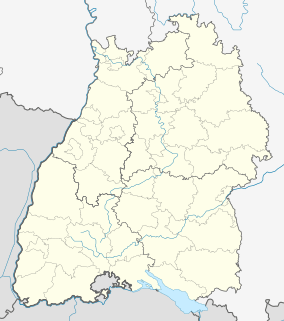Singen
Singen is an industrial city in the very south of Baden-Württemberg in southern Germany and just north of the German-Swiss border.
Singen | |
|---|---|
 Singen from the Hohentwiel | |
 Coat of arms | |
Location of Singen within Konstanz district | |
 Singen  Singen | |
| Coordinates: 47°45′46″N 8°50′24″E | |
| Country | Germany |
| State | Baden-Württemberg |
| Admin. region | Freiburg |
| District | Konstanz |
| Subdivisions | 7 |
| Government | |
| • Mayor | Bernd Häusler (CDU) |
| Area | |
| • Total | 61.75 km2 (23.84 sq mi) |
| Elevation | 429 m (1,407 ft) |
| Population (2018-12-31)[1] | |
| • Total | 47,723 |
| • Density | 770/km2 (2,000/sq mi) |
| Time zone | CET/CEST (UTC+1/+2) |
| Postal codes | 78224 |
| Dialling codes | 07731 |
| Vehicle registration | KN |
| Website | www.in-singen.de |
Location
Singen is an industrial city situated in the very south of Baden-Württemberg in Germany close to Lake Constance just north of the German-Swiss border and is the most important city in the Hegau area.
Landmarks

The most famous landmark of Singen is Hohentwiel, a volcanic stub on which there are the ruins of a fortress destroyed by French troops during the Napoleonic Wars.
World War 2 'Singen route'
Singen is notable in military history for the Singen route in World War II. This route into Switzerland was discovered by Dutch naval lieutenant Hans Larive in 1940 on his first escape attempt from an Oflag (prisoner's camp for officers) in Soest. After being captured at the Swiss border near Singen, the interrogating Gestapo officer was so confident the war would soon be won by Germany that he told Larive the safe way across the border. Larive did not forget and many prisoners later escaped using this route - that included Larive himself, Francis Steinmetz, Anthony Luteyn, Airey Neave, Pat Reid and Howard Wardle in their escapes from Colditz Castle when Colditz was used in the war as Oflag IV-C.[2]
Transportation
Singen is an important regional train hub with three railway lines and the terminal of the Stuttgart-Hattingen railway with connections to Stuttgart and the Swiss Schaffhausen.
Twin towns - sister cities
Singen is twinned with:[3]




Notable people
- Herbert Haag (1915–2001), a Catholic theologian
- Arthur Kaufmann (lawyer) (1923–2001), lawyer, legal philosopher, professor in Saarbrücken
- Karl Schmid (historian) (1923–1993), historian, professor in Münster and Freiburg
- Walter Brown (politician) (born 1930), business administration professor and politician (1969-79 Standing 1979-83 and Minister for Social Affairs of Schleswig-Holstein)
- Paul Wehrle (bishop) (born 1940), Auxiliary Bishop in the Archdiocese of Freiburg
- Wolfgang Hepp (born 1941), an actor (The fallers; Tatort)
- Roland Benz (born 1943), biotechnologist, Professor at the University of Würzburg
- Bertold Siber (born 1943), chef
- Michael Molls (1944), radiotherapy oncologist and professor at the Munich Technical University
- Friedemann Hahn (born 1949), artist, professor at the Academy of Fine Arts of the University of Mainz
- Rafael Ferber (born 1950), philosopher, professor at the University of Lucerne
- Knut Folkerts (born 1952), former terrorist Red Army Faction (RAF)
- Markus Weggenmann (born 1953), painter
- Manfred Klemann (born 1953), publisher and writer
- Siegfried Dietrich (born 1954), physicist, Professor, Director of the Max Planck Institute for Metals Research
- Pepe Danquart (born 1955), filmmaker (Oscar winner 1994)
- Didi Danquart (born 1955), director and filmmaker (Viehjud Levi), a professor at the "Staatliche Hochschule für Gestaltung" in Karlsruhe
- Markus Schwendemann (1957–1994), opera singer
- Klaus Meier panel (born 1958), athlete and Olympian
- Beatrix Ruf (born 1960), director and curator of the Kunsthalle Zürich
- Veronika Olma (born 1962), born in Beuren an der Aach, painter
- Christoph Schnaudige (born 1963), District Administrator of Karlsruhe
- Birgit Homburger (born 1965), politician (FDP)
- Matthias Dinter (born 1968), writer, director (German Film Award)
- Jens Truckenbrod (born 1980), football player
- Cédric Soares (born 1991), football player
References
- "Bevölkerung nach Nationalität und Geschlecht am 31. Dezember 2018". Statistisches Landesamt Baden-Württemberg (in German). July 2019.
- Larive; the man who came in from Colditz, Leo de hartog; officieren achter prikkeldraad 1940-1945
- "Partnerstädte der Stadt Singen". in-singen.de (in German). Singen. Retrieved 2019-11-28.